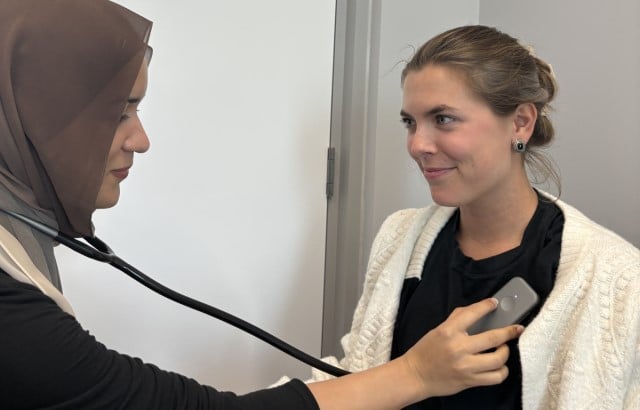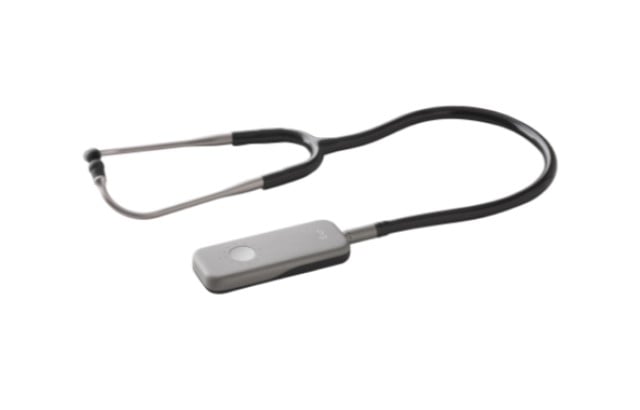British doctors have created an AI-powered stethoscope that can detect three deadly heart conditions in just 15 seconds, faster than it takes to read this paragraph.
The breakthrough comes from researchers at Imperial College London and Imperial College Healthcare NHS Trust, who tested their smart device on more than 12,000 patients across 200 GP surgeries in the UK. The results were presented at Europe’s largest heart conference in Madrid, sending shockwaves through the medical community.
AI Stethoscope Outperforms Traditional Methods
The study revealed dramatic improvements in heart disease detection rates. Patients examined with the AI stethoscope were 2.3 times more likely to receive a heart failure diagnosis within 12 months compared to those examined with traditional methods.
For atrial fibrillation, a dangerous heart rhythm disorder that often goes unnoticed, the AI device proved 3.5 times more effective at detection. Heart valve disease diagnoses increased by 92% when doctors used the smart stethoscope.
Dr. Patrik Büchtiger from Imperial College London’s National Heart and Lung Institute explained the significance: “The design of the stethoscope has been unchanged for 200 years until now. So it is incredible that a smart stethoscope can be used for a 15-second examination, and then AI can quickly deliver a test result.”
How the Smart Stethoscope Works
The device, manufactured by California-based Eko Health, looks nothing like the traditional stethoscope doctors have used since 1816. About the size of a playing card, it combines multiple technologies into one compact unit.
When placed on a patient’s chest, the smart stethoscope simultaneously records:
- Heart sounds through an advanced microphone
- Electrical signals via built-in ECG electrodes
- Blood flow patterns undetectable to human ears
This data streams to secure cloud servers where AI algorithms trained on tens of thousands of patient records analyze the information. Within seconds, the system sends back results to the doctor’s smartphone, flagging potential heart failure, atrial fibrillation, or heart valve disease.

Real-World Impact on Patient Care
Heart disease remains the leading cause of death globally, yet many patients only receive diagnoses when they arrive at emergency rooms in critical condition.
Dr. Mihir Kelshiker, also from Imperial College, highlighted this problem: “Most people with heart failure are only diagnosed when they arrive in A&E seriously ill. This trial shows that AI-enabled stethoscopes could change that, giving GPs a quick, simple tool to spot problems earlier.”
Traditional heart disease diagnosis often requires expensive echocardiograms or lengthy specialist referrals. The AI stethoscope enables primary care doctors to make accurate assessments during routine appointments.
Clinical Validation Proves Effectiveness
The Imperial College study represents one of the largest real-world trials of AI diagnostic technology in primary care. Researchers compared outcomes from 12,000 patients across two groups, those examined with AI stethoscopes at 96 GP surgeries versus control groups at 109 surgeries using traditional methods.
The results exceeded expectations across all three conditions:
- Heart failure detection increased by 133%
- Atrial fibrillation diagnosis rates jumped 245%
- Heart valve disease identification rose 92%
Dr. Sonya Babu-Narayan, clinical director at the British Heart Foundation, called the findings “an elegant example of how the humble stethoscope, invented more than 200 years ago, can be upgraded for the 21st century.”
FDA Approval and Technology Validation
Eko Health’s AI algorithms have already received FDA clearance in the United States. The company’s heart failure detection system demonstrated 94.1% sensitivity and 84.5% specificity in clinical trials, significantly outperforming traditional screening methods that achieved only 41.2% sensitivity.
The FDA clearance followed rigorous testing showing the AI system’s diagnostic performance matched that of echocardiography, the current gold standard for heart assessment. This validation gives healthcare providers confidence in the technology’s reliability for patient care decisions.
Expansion Plans Across Healthcare Systems
Following the successful UK trial, NHS planners are preparing to roll out AI stethoscopes across GP practices in south London, Sussex, and Wales. The expansion represents the largest deployment of AI diagnostic technology in primary care to date.
Prof. Mike Lewis, scientific director for innovation at the National Institute for Health and Care Research, emphasized the technology’s potential: “This tool could be a real changer for patients, bringing innovation directly into the hands of GPs. The AI stethoscope gives local clinicians the ability to spot problems earlier, diagnose patients in the community, and address some of the big killers in society.”
Addressing Potential Limitations
The AI system can produce false positives, incorrectly flagging healthy patients as having heart conditions. However, the benefits of early detection far outweigh these risks for patients with suspicious symptoms.
The research team stressed that AI stethoscopes should complement, not replace, clinical judgment. They recommend using the technology for patients presenting with symptoms like breathlessness or fatigue, rather than for routine screening of healthy individuals.
Healthcare Cost Implications
Beyond improving patient outcomes, the AI stethoscope could generate significant healthcare savings. Early heart disease detection typically costs thousands less than emergency treatment for advanced conditions.
Traditional cardiac workups involving specialist referrals, echocardiograms, and hospital admissions can cost healthcare systems $3,000-$5,000 per patient. The AI stethoscope examination costs under $50, making it highly cost-effective for widespread screening programs.
Future of AI in Medical Diagnosis
Similar AI-powered tools are under development for lung disease detection, pregnancy complications, and other conditions requiring quick assessment. AI stethoscopes enable more accurate diagnoses while maintaining the human touch that patients value.
As healthcare systems worldwide face increasing pressure from aging populations and rising disease rates, tools like the AI stethoscope offer hope for more efficient, accessible medical care. The 15-second heart check may soon become as routine as taking a patient’s temperature.















